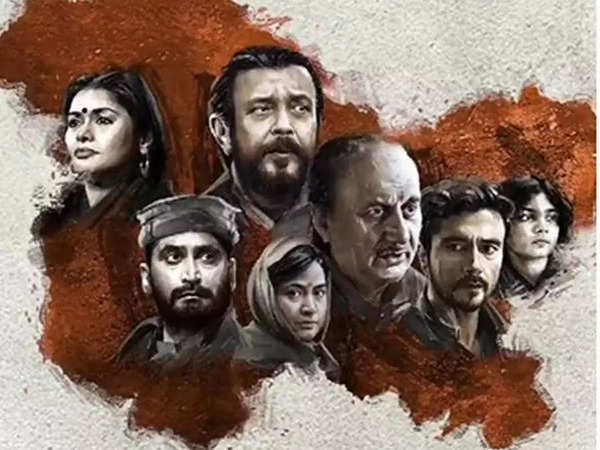The film, which won the National Award on Thursday, was criticised by the Opposition after it was released last year; it was also at the centre of a row at a film festival when an Israeli director labelled it “propaganda”.
Honoured with a National Film Award for Best Film for National Integration, The Kashmir Files is a movie that has divided opinions ever since it was released last year because of its contested portrayal of the Kashmiri Pandit exodus from Kashmir in 1990.
The film caused a stir last November when Israeli filmmaker and International Film Festival of India (IFFI) jury chief Nadav Lapid called the film “propaganda”. Congress members at the time said “hate” had been eventually “called out” while the BJP asserted that the “truth” about Kashmiri Pandits would triumph.
At the time of its release in March 2022, the Vivek Aghnihotri-directed film received support from the BJP. Six BJP-ruled states — Uttar Pradesh, Karnataka, Haryana, Goa, Rajasthan, and Madhya Pradesh — gave the film tax-free status.
Announcing the tax exemption on March 13, Madhya Pradesh Chief Minister Shivraj Singh Chouhan said the film had to “be watched by the maximum people”. He added, “Movie #The Kashmir Files is a heart-wrenching narration of the pain, suffering, struggle, and trauma faced by Kashmiri Hindus in the 90s.”
The Madhya Pradesh government declared leave for policemen to watch the film. It also announced a genocide museum for Kashmiri Pandits, at a March 25 event, attended by Vivek Agnihotri.
Then BJP national spokesperson R P Singh announced free tickets for The Kashmir Files to college students at Rajinder Nagar, the constituency in Delhi he contested from in 2020. “Let the new generation visit the history which scarred the soul of the nation,” he tweeted.
In Assam, Chief Minister Himanta Biswa Sarma announced on March 16 that government employees would be given half-day special leave to watch the film.
In Karnataka, BJP MLA Basanagouda Patil Yatnal announced that he would fund one show of the film per day for an entire week “so that people can watch it free of cost” in his constituency in Vijayapura. A similar kind of backing was given to The Kerala Story this May. After West Bengal banned the film, the CMs of several BJP-led states backed the movie, urged people to watch it and saw it themselves.
At an election rally in Karnataka on May 5, Prime Minister Narendra Modi also referred to the movie and accused the Congress of having a “backdoor understanding with terror groups”. He also said the Congress’s “situation” ahead of the state’s May 10 elections was “so bad” that the party was “taking issue” with him “chanting ‘Jai Bajrang Bali’”.
“There was a lot of discussion about The Kerala Story, which discusses ploys to make the country hollow from within. They say the movie is based on terrorist plots in just one state… such a beautiful state where people are hard-working and talented. The Kerala Story has exposed the terror conspiracies. But look at the misfortune of the country. The Congress today is standing with such terror elements that have destroyed the nation. The Congress has a backdoor understanding with them. People of the state should be wary of the Congress… It has surrendered in front of terrorists to appease its vote bank,” Modi said.
Other films have also received the BJP’s acknowledgement and support since the party has come to power. In June 2022, Union Home Minister Amit Shah attended a special screening of Samrat Prithviraj, a biopic of ruler Prithviraj Chauhan starring Akshay Kumar and Manushi Chillar in the lead roles. Uttar Pradesh CM Yogi Adityanath watched the film and declared it tax-free in the state. Madhya Pradesh followed suit hours later.
In 2019, the year of the Lok Sabha polls, there were films that directly or indirectly referenced those in power. A biopic about the Prime Minister himself called PM Modi released on May 24, after its original release date on May 11 was stalled by the Election Commission (EC) till the final phase of voting on May 19. It noted the film “has the potential to disturb the level playing field during the elections”, citing election “code of conduct” rules.
The trailer of the film was launched by then Maharashtra CM Devendra Fadnavis of the BJP. Former Congress leader Kapil Sibal called the film “motivated” and “political” with the Congress filing a complaint with the EC and saying that the film was not an “artistic venture”. After the filmmakers received a notice from the EC, the producer said they had no links with any political party and had “put in their money for making the film”.
The same year, the BJP’s official social media handles shared the trailer of The Accidental Prime Minister, again a biopic, starring Anupam Kher as former Prime Minister Manmohan Singh. “Riveting tale of how a family held the country to ransom for 10 long years. Was Dr Singh just a regent who was holding on to the PM’s chair till the time he was ready? Watch the official trailer of #TheAccidentalPrimeMinister, based on an insider’s account, releasing on 11 Jan!” read a post by the party.
Uri: The Surgical Strike, released in January 2019, starring Vicky Kaushal as the lead, based on strikes carried out against Pakistani terrorist camps, was another film that was talked about widely, becoming a part of official discourse. Former Finance Minister Piyush Goyal referenced the film’s popular dialogue — “how’s the josh?” — in his interim Budget speech in February 2019. SOURCE
The article’s content, excluding the headline, has been directly taken from a third-party syndicated feed without any modifications or editing by the Kashmir InFocus staff.




